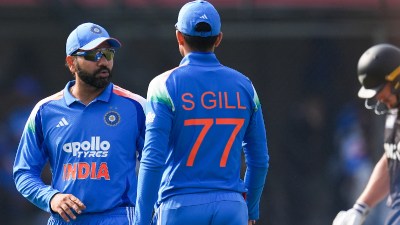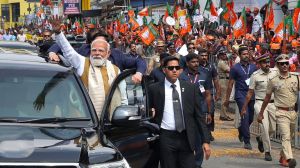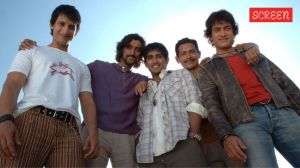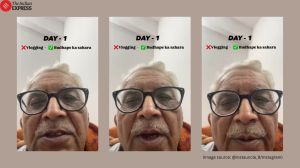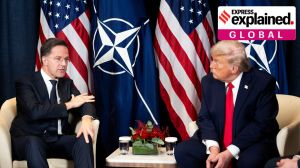145;They didn146;t uprise146;
...

|
|
|
9/11 altered the lexicon of international engagement. As it melted seamlessly into an evolving plot, linguists were kept busy
|
|
|
As another September 11 comes by, it is interesting to acknowledge how our language of terrorism and of war has changed. If inquiry into the devastation visited upon Manhattan that Tuesday morning two years ago bound acts of terror around the world in an one-size-fits-all template, 9/11 also altered the lexicon of international engagement. As 9/11 melted seamlessly into an evolving plot, with the attacks on Afghanistan and Iraq the two main acts so far, linguists were kept busy.
Strange that it happened, though, after an event that repeatedly elicited one phrase. 8220;Words fail us,8221; said commentators describing the immediate aftermath. 8220;Word fail us,8221; said leading writers as they stepped out of their fictional universes to assist comprehension of this new violence.
But the dust had barely settled in downtown Manhattan, and new words, new phrases were employed. Ground Zero was the site of disaster. It was a strange description, this use of nuclear weapons terminology, these words denoting the site of impact in a nuclear explosion. This is a New Kind Of War, said American President George W. Bush. It took some time before more eloquent analysts cottoned on and christened the end of the post-Cold War on September 11, 2001, by announcing the beginning of the Hot War 8212; now on, America would abandon containment and contentment with its spheres of influence and go on an offensive against possible 8212; credible, neocons would argue 8212; threats to its security and interests.
But Bush was clearly the lead formulator of phrases. During his election campaign he had groped for words, now they kept tripping off his tongue. 8220;When I was coming up, with what was a dangerous world,8221; he said in a burst of prescience before sweeping into the White House, 8220;we knew exactly who the 8216;they8217; were. It was us versus them8230; today we8217;re not so sure who the they are, but we know they8217;re there.8221; Post-9/11 They acquired names. Osama bin Laden, he who had not been named so far, said Bush, was the Evil One. Later, on the eve of defeat, Saddam Hussein would add plagiarism to his abundant sins, and call Blair and Bush the Evil Ones. Bush also showed an uncanny understanding of distant lands by promising to Smoke 8217;Em Out of their hiding places in Central Asia8217;s caves and tunnels.
The prime strategic objectives too were rapidly formulated for the Hot War: Regime Change in assorted capitals, a Battle for the Hearts and Minds of their confused citizenry. Any goof-ups were glibly waved away; clinical words like Collateral Damage and Unintended Consequences glossed over the horror of civilian deaths and warm overtures like Friendly Fire and Blue on Blue hid embarrassment over striking against the coalition8217;s own troops. Here, General Wesley Clark, the man who would be Democratic challenger for the 2004 presidency, added his bit to shrug off flawed forecasts. 8220;They didn8217;t uprise,8221; he concluded when the residents of Basra did not revolt against the Saddam regime.
Shock and Awe was the coalition8217;s proposed opening to the invasion of Iraq. It was a change from American war planners8217; complaint during the Afghanistan campaign that there were few High Value Targets in the Taliban8217;s dusty realm; in Mesopotamia they could undertake Sensitive Site Exploration, areas where Weapons of Mass Destruction could be hidden.
They8217;re still at it, exploring sensitive sites. As Christopher Hitchens cheekily pointed out, coalition troops are only heeding the rallying cry of pacifists before the invasion of Iraq: Give The Inspectors More Time.
Funny, huh?
You could be forgiven for presuming that war is a movie, with a band of scriptwriters struggling to muster box office numbers with that one winning line to match 8220;Play it again, Sam8221; or 8220;The name8217;s Bond.8221; You could be excused for wondering whether once the Embedded Journalists and Unilaterals have gone home, those blood-splattered, mangled bodies too will pick themselves up and stroll off. 24-hour television must perhaps necessarily come loaded with sound bite and disappearing image. Repetition and jargonised lingo are perhaps the reporter8217;s most successful routes to attention.
But the fight against terrorism demands more than military manoeuvres. It must also be a 8220;war against cliche8221;. Cliches dehumanise, glib phrases decontextualise. Act of war and terrorism 8212; near or far 8212; are extremely difficult to comprehend. Language is central to that process of comprehending, of bearing witness, of ensuring that each instance is reported and recorded in its individual frame, of securing dignity for the victims in their death and devastation. Two years ago, words would not come to capture an act of unprecedented brutality. Now the challenge lies in stopping the easy phrases from tumbling forth so smoothly.
- 01
- 02
- 03
- 04
- 05


